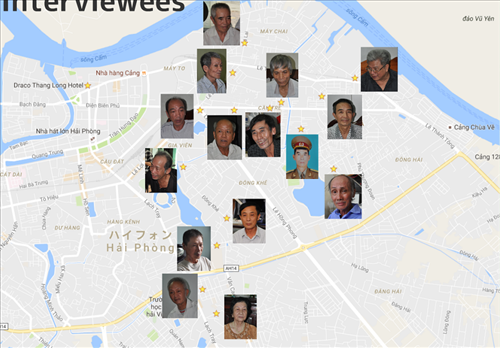
The topic presented by the guest speaker at the meeting was: "Socio-economic research findings on Agent Orange victims and their families in Hai Phong, Vietnam." For the club members, in addition to hearing about the research findings, this was also an opportunity to learn how to present a scientific study concisely and clearly in English.

Professor Norifumi Namatame and his colleagues in the research group
In his presentation, Professor Norifumi Namatame also provided a general overview of the steps involved in conducting a scientific study, from developing a research proposal and plan to field surveys. The research results also revealed new findings from a social science perspective regarding victims of Agent Orange in Vietnam, alongside numerous other studies from medical, healthcare, and social activity perspectives.
Professor Norifumi Namatame concluded his presentation after the first 30 minutes. Immediately, comments and discussions arose from the club members. On behalf of the Club, Dr. Pham Huy Cuong (Student Affairs Department) thanked the guest speaker for his presentation, which contained a wealth of interesting information, not only regarding the research results but also the very detailed sharing of the research steps taken by Professor Nori and his colleagues in Vietnam.

Club members enthusiastically raised questions and exchanged ideas: Why was Hai Phong chosen as the research area when it was not a place directly affected by Agent Orange during the war? (Dr. Hua Ngoc Tan, Department of Linguistics); This could be an initial study, and does the research team plan to conduct research in other areas, especially Central and Southern Vietnam? (Ms. Nguyen Thi Kim Sau, Student Affairs and Support Department); What difficulties did the research team encounter during the field survey? (Dr. Dang Hoang Giang, Department of Literature and Language); Where did the research team seek funding? (Ms. Nguyen Tich Nghi, Personnel and Organization Department); Suggestions for conducting research on second and third-generation Agent Orange victims being cared for in centers in Hanoi? (Dr. Nguyen Thi Thu Huong, Cooperation and Development Department); Comparing the difficulties in supporting victims of Agent Orange in Vietnam and victims of nuclear disasters in Japan (Dr. Pham Huy Cuong, Department of Student Affairs and Activities)… All questions were received and discussed very openly by Professor Norifumi Namatame.

The research findings of Professor Norifumi Namatame on victims of Agent Orange in Vietnam.
This lunch started 15 minutes later than usual, and the discussions continued until the end. The guests shared the difficulties their group faced due to cultural differences during their first research project in Vietnam. The LBCE members enthusiastically shared their experiences and offered solutions to the situations presented.

Author:Cuong Pham
Newer news
Older news